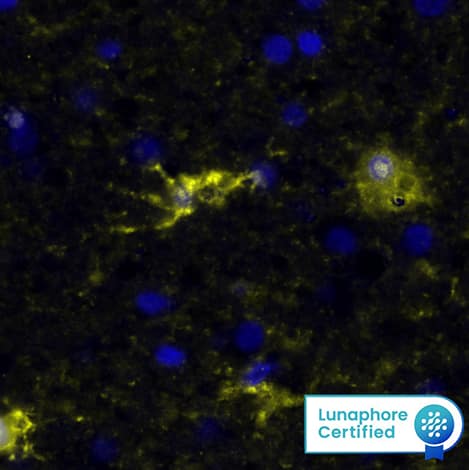Human VSIG4 Antibody Summary
Arg20-Pro283
Accession # Q9Y279
Customers also Viewed
Applications
Please Note: Optimal dilutions should be determined by each laboratory for each application. General Protocols are available in the Technical Information section on our website.
Preparation and Storage
- 12 months from date of receipt, -20 to -70 °C as supplied.
- 1 month, 2 to 8 °C under sterile conditions after reconstitution.
- 6 months, -20 to -70 °C under sterile conditions after reconstitution.
Background: VSIG4
VSIG4 (V-set and immunoglobulin domain containing 4), also known as CRIg and Z39IG, is a 45 kDa, type I transmembrane protein of the B7 family within the Ig superfamily that is expressed only in tissue-resident macrophages (1‑4). The gene is located on the X chromosome (2). The human VSIG4 cDNA encodes 399 amino acids (aa) including a 19 aa signal sequence, a 264 aa extracellular domain (ECD) containing a V-type and a C2-type Ig domain, a 21 aa transmembrane domain and a 95 aa cytoplasmic domain (3). The human VSIG4 ECD shares 84% aa identity with canine VSIG4. Within the IgV domain, it shares 90%, 80%, and 78% aa identity with bovine, mouse and rat VSIG4, respectively; these animals lack the C2-type domain. Splice isoforms of 321, 305, 272, 201, and 199 aa lack all or part of the cytoplasmic domain, the C2-type Ig domain and/or the transmembrane domain (5). VSIG4 is specifically expressed on macrophages in the thymic medulla, peritoneum, alveoli, synovia, adipose and heart, liver Kupffer cells, placental Hofbauer cells, and atherosclerotic foam cells (1‑4, 6‑9). It is absent on infiltrating macrophages (8). VSIG4 is a complement receptor that binds C3b and iC3b fragments, internalizes them to recycling endosomes, and is recycled to the cell surface (4, 6). It contributes significantly to innate immunity by binding and phagocytosis of complement-opsonized invading pathogens (4, 8, 10). Binding of either native or recombinant soluble VSIG4 to C3b inhibits complement amplification through the alternative, but not classical, pathway (10, 11). VSIG4 is also a negative regulator of mouse and human T cell activation (2). Although VSIG4 engagement may activate NF kappa B and thus be pro-inflammatory in some cases, many of its activities are important in resolving, rather than initiating, inflammation (1, 2, 7, 10, 11).
- He, J.Q. et al. (2008) Mol. Immunol. 4041.
- Vogt, L. et al. (2006) J. Clin. Invest. 116:2817.
- Langnaese, K. et al. (2000) Biochim. Biophys. Acta 1492:522.
- Helmy, K. et al. (2006) Cell 124:915.
- Entrez protein Accession # EAX05393, NP_001093901, CAI42052, CAI4205, EAX05394.
- Tanaka, M. et al. (2008) Clin. Exp. Immunol. 154:38.
- Lee, M-Y. et al. (2006) J. Leukoc. Biol. 80:922.
- Gorgani, N.N. et al. (2008) J. Immunol. 181:7902.
- Walker, M.G. (2002) Biochim. Biophys. Acta 1574:387.
- Wiesmann, C. et al. (2006) Nature 444:217.
- Katschke, K.J. et al. (2007) J. Exp. Med. 204:1319.
Product Datasheets
Citations for Human VSIG4 Antibody
R&D Systems personnel manually curate a database that contains references using R&D Systems products. The data collected includes not only links to publications in PubMed, but also provides information about sample types, species, and experimental conditions.
3
Citations: Showing 1 - 3
Filter your results:
Filter by:
-
Dendritic Cells or Macrophages? The Microenvironment of Human Clear Cell Renal Cell Carcinoma Imprints a Mosaic Myeloid Subtype Associated with Patient Survival
Authors: D Brech, AS Herbstritt, S Diederich, T Straub, E Kokolakis, M Irmler, J Beckers, FA Büttner, E Schaeffele, S Winter, M Schwab, PJ Nelson, E Noessner
Cells, 2022-10-19;11(20):.
Species: Human
Sample Types: Whole Tissue
Applications: IHC -
Cellular Differentiation of Human Monocytes Is Regulated by Time-Dependent Interleukin-4 Signaling and the Transcriptional Regulator NCOR2
Authors: Jil Sander, Susanne V. Schmidt, Branko Cirovic, Naomi McGovern, Olympia Papantonopoulou, Anna-Lena Hardt et al.
Immunity
-
Spatial proteogenomics reveals distinct and evolutionarily conserved hepatic macrophage niches
Authors: Guilliams M, Bonnardel J, Haest B Et al.
Cell
FAQs
No product specific FAQs exist for this product, however you may
View all Antibody FAQsIsotype Controls
Reconstitution Buffers
Secondary Antibodies
Reviews for Human VSIG4 Antibody
There are currently no reviews for this product. Be the first to review Human VSIG4 Antibody and earn rewards!
Have you used Human VSIG4 Antibody?
Submit a review and receive an Amazon gift card.
$25/€18/£15/$25CAN/¥75 Yuan/¥2500 Yen for a review with an image
$10/€7/£6/$10 CAD/¥70 Yuan/¥1110 Yen for a review without an image
















